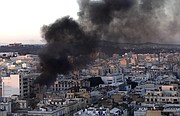Tunisians riot, force leader from power
TUNIS, Tunisia (AP) - After 23 years of iron-fisted rule, the president of Tunisia was driven from power Friday by violent protests over soaring unemployment and corruption. Virtually unprecedented in modern Arab history, the populist uprising sent an ominous message to authoritarian governments that dominate the region.
The office of Saudi King Abdullah confirmed early today that ousted President Zine El Abidine Ben Ali and his family had landed in Saudi Arabia, after several hours of mystery over his whereabouts. "As a result of the Saudi kingdom's respect for the exceptional circumstances the Tunisian people are going through, and with its wish for peace and security to return to the people of Tunisia, we have welcomed" him, the statement said.
Tunisians buoyant over Ben Ali's ouster faced uncertainly, however, about what's next for the North African nation. The country was under the caretaker leadership of the prime minister who took control, the role of the army in the transition was unknown, and it was uncertain whether Ben Ali's departure would be enough to restore calm.
The ouster followed the country's largest protests in generations and weeks of escalating unrest, sparked by one man's suicide and fueled by social media, cell phones and young people who have seen relatively little benefit from Tunisia's recent economic growth. Thousands of demonstrators from all walks of life rejected Ben Ali's promises of change and mobbed Tunis, the capital, to demand that he leave.
The government said at least 23 people have been killed in the riots, but opposition members put the death toll at more than three times that.
On Friday, police repeatedly clashed with protesters, some of whom climbed onto the entrance roof of the dreaded Interior Ministry, widely believed for years to be a place where the regime's opponents were tortured.
With clouds of tear gas and black smoke drifting over the city's whitewashed buildings, Prime Minister Mohammed Ghannouchi went on state television to announce that he was assuming power in this North African nation known mostly for its wide sandy beaches and ancient ruins.
"I take over the responsibilities temporarily of the leadership of the country at this difficult time to help restore security," Ghannouchi said in a solemn statement on state television.



